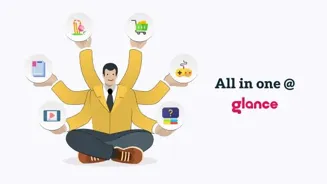Discover 10 groundbreaking inventions shaping the 21st century. Explore how tech marvels are reshaping our world!
Arrey bhaiyon aur behnon! In this fast-paced duniya, technology is changing faster than
you can say "chai break." So, keeping up with the latest inventions can feel like chasing a rickshaw in peak traffic. But don't worry, hum hain na!
We've compiled a list of the 10 most important inventions of the 21st century that you simply must know about. These inventions aren't just cool gadgets; they're changing the way we live, work, and interact with the world. So, grab your spectacles and get ready to be amazed!
Advanced Gene Editing (CRISPR): The Genetic Scissors!
Imagine being able to edit your DNA, like correcting a typo in a document. CRISPR technology (Clustered Regularly Interspaced Short Palindromic Repeats) allows scientists to do just that. It acts like a pair of molecular scissors, precisely cutting and modifying DNA sequences.
This groundbreaking invention holds immense potential for treating genetic diseases like cystic fibrosis and sickle cell anemia. Doctors hope it will help many children battling these genetic disorders and give them a chance to live normal lives.
It also has applications in agriculture, such as creating crops that are more resistant to pests and diseases, which can help produce more food, reducing the chances of people going hungry because of shortages.
But, like any powerful tool, CRISPR raises ethical questions about its use, so experts are coming up with rules to make sure it is used responsibly.
mRNA Vaccines: A New Era of Immunity!
The COVID-19 pandemic introduced the world to mRNA vaccines. Unlike traditional vaccines that use weakened or inactive viruses, mRNA vaccines use messenger RNA (mRNA) to instruct our cells to produce a harmless piece of a virus, triggering an immune response.
The speed and efficiency of mRNA vaccine development proved to be a game-changer in fighting the pandemic. The success of mRNA vaccines has spurred research into using this technology to develop vaccines for other infectious diseases like flu, HIV, and even cancer.
This approach promises faster vaccine development and a more adaptable response to emerging threats. In the future, imagine we could modify them to treat conditions, as well as stop the spread of disease. This will be beneficial, especially in places where there are not many modern facilities.
Artificial Intelligence (AI): The Smart Machine Revolution!
Artificial Intelligence is one of the most transformative technologies of our time. It's everywhere, from the voice assistants on our smartphones (like Siri and Alexa) to the algorithms that personalize our online experiences.
AI is used to solve complex problems in fields like healthcare, finance, and transportation. It can assist doctors to diagnose ailments with higher accuracy and quicker speed. Self-driving cars, powered by AI, promise to revolutionize transportation, making it safer and more efficient.
However, the rise of AI also brings concerns about job displacement and the ethical implications of increasingly intelligent machines. AI will impact almost every area and industry which benefits humankind. Ethical guidance on AI developments is important to ensure a secure future.
Renewable Energy Technologies: Powering a Sustainable Future!
With growing concerns about climate change, renewable energy technologies are more important than ever. Solar panels, wind turbines, and geothermal energy are becoming increasingly efficient and affordable.
These technologies offer a cleaner alternative to fossil fuels, reducing greenhouse gas emissions and mitigating climate change. India is making significant investments in solar and wind energy, aiming to become a leader in renewable energy production.
These developments are crucial to ensuring a sustainable future for generations to come, helping rural communities access electricity and improve living standards. Reducing dependency on traditional sources will help to protect our world and environment.
3D Printing: Building the Future, Layer by Layer!
3D printing, also known as additive manufacturing, allows us to create three-dimensional objects from digital designs by layering materials like plastic, metal, or ceramics. This technology is transforming manufacturing, healthcare, and construction.
Doctors can use 3D printing to create customized prosthetics and medical implants. Architects use 3D printing to build scale models. It is being used to make affordable, customized homes, especially useful for disaster relief or low-income communities.
3D printing will unlock a whole new world of possibilities as the technology advances further, reducing the waste of any materials used.
Quantum Computing: Supercharging Computation!
Quantum computing harnesses the principles of quantum mechanics to perform calculations that are impossible for classical computers. Quantum computers have the potential to revolutionize fields like drug discovery, materials science, and artificial intelligence.
They could simulate complex molecular interactions, leading to the development of new drugs and materials. Quantum computing is still in its early stages, but it holds immense promise for solving some of the world's most challenging problems.
Experts are very hopeful that the technology can be harnessed safely and securely. Quantum computer has the potential to transform various industries.
Advanced Robotics: More Than Just Humanoids!
Modern robotics goes beyond just humanoid robots. It includes robots designed for specific tasks, like assisting in surgery, inspecting infrastructure, or exploring hazardous environments. Robots are improving the accuracy and efficiency of surgical procedures.
They are helping to maintain aging infrastructure by performing inspections in dangerous conditions. As robotics continues to advance, we can expect to see more robots working alongside humans in a variety of fields, helping to improve productivity and safety. This will help to improve the economy.
Blockchain Technology: Beyond Cryptocurrencies!
Blockchain technology, best known for its association with cryptocurrencies like Bitcoin, is finding applications in various industries. It's a decentralized ledger that records transactions securely and transparently.
Blockchain can be used to track supply chains, verify identities, and secure voting systems. Its ability to ensure transparency and security makes it a valuable tool for a wide range of applications. Experts believe this will prove transformational for how we deal with transactions in the future.
Nanotechnology: Small Size, Big Impact!
Nanotechnology involves manipulating materials at the atomic and molecular level. This technology is being used to develop new materials with enhanced properties, such as greater strength, conductivity, or reactivity. Nanotechnology has applications in medicine, manufacturing, and energy.
It is used to make targeted drug delivery systems that can deliver medication directly to cancer cells. It is also used to create stronger and lighter materials for aerospace applications. The smaller objects become, the applications increase.
Brain-Computer Interfaces (BCIs): Connecting Minds and Machines!
Brain-computer interfaces (BCIs) allow us to communicate with computers using brain activity. These interfaces have the potential to help people with paralysis control prosthetic limbs or communicate through computers. BCIs are also being explored for applications in gaming and assistive technology.
While still in its early stages, BCI technology holds great promise for improving the lives of people with disabilities and enhancing human capabilities. Scientists are hopeful this can bring a better quality of life for people going through a difficult medical condition.
So there you have it!
The 10 most important inventions of the 21st century. These technologies are transforming our world in profound ways. Stay curious, stay informed, and embrace the future! The future is bright.
AI Generated Content. Glance/InMobi shall have no liability for the content















